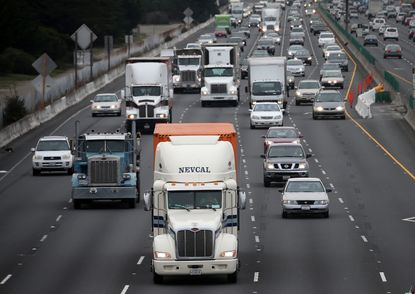Will Trump put the brakes on fuel standards?
President Trump pledged to review the strict fuel efficiency standards set by the Obama administration

The smartest insight and analysis, from all perspectives, rounded up from around the web:
President Trump is granting automakers "their top wish," said Bill Vlasic at The New York Times. While visiting Detroit last week, Trump pledged to reopen a government review of the strict fuel efficiency standards set by the Obama administration in 2012. The rules, "a pillar of President Obama's climate change legacy," require automakers to almost double the average fuel economy for new cars and trucks to 54.5 miles per gallon by 2025. The Environmental Protection Agency affirmed those standards in January, wrapping up a midterm review of the agreement in the final days of Obama's presidency. But automakers complain that the review didn't give them enough time to contest the government's fuel targets, which they say are too ambitious. Now they'll get a chance to argue their case before an administration that's vowed "to remove the shackles of regulation" from industry.
Automakers say they want fuel standards "that recognize today's market realities," said Brent Snavely at the Detroit Free Press. The Obama administration initially estimated the new standards would save drivers $1.7 trillion in fuel costs over the life of the vehicles, while costing the auto industry roughly $200 billion over 13 years — costs that car makers say would be passed on to consumers. The new rules were supposed to encourage automakers to build more electric and hybrid vehicles. But since then, gas prices have plummeted and consumers have once again started "craving fuel-thirsty SUVs." The U.S. auto industry might regret getting what it wants, said Joann Muller at Forbes. Right now, other countries are imposing tough emissions regulations, making them unlikely to buy gas-guzzling American autos. "If the U.S. relaxes the standards, automakers could quickly get lapped by more innovative global players."
Subscribe to The Week
Escape your echo chamber. Get the facts behind the news, plus analysis from multiple perspectives.

Sign up for The Week's Free Newsletters
From our morning news briefing to a weekly Good News Newsletter, get the best of The Week delivered directly to your inbox.
From our morning news briefing to a weekly Good News Newsletter, get the best of The Week delivered directly to your inbox.
Rather than rolling back fuel standards, Trump should scrap them entirely, said Virginia Postrel at Bloomberg. Fleetwide fuel economy standards "are a terrible way to achieve either fuel savings or lower carbon emissions." They make newer vehicles more expensive, which means drivers hold on to gas-guzzling older autos longer. Fuel standards also meddle in corporate strategy by compelling companies "that are good at making and selling larger vehicles to make and sell little cars as well." Forcing General Motors to churn out Chevy Cruzes "doesn't do much for the environment."
Detroit shouldn't expect any regulatory relief soon, said Aarian Marshall at Wired. A new EPA review will take months, and California — the nation's largest car market — has the authority to set its own tailpipe standards under the Clean Air Act. California helped develop the Obama-era rules, and its more stringent standards are followed by 13 other states and Washington, D.C. That means automakers will either have to build different cars for different markets, which is "untenable businesswise," or stick to the old standards. Trump could take the unprecedented step of trying to revoke California's special status, but that would trigger a massive legal battle. "In summation, buckle up."
Create an account with the same email registered to your subscription to unlock access.
Sign up for Today's Best Articles in your inbox
A free daily email with the biggest news stories of the day – and the best features from TheWeek.com
-
 'Making a police state out of the liberal university'
'Making a police state out of the liberal university'Instant Opinion Opinion, comment and editorials of the day
By Harold Maass, The Week US Published
-
 8 looming climate tipping points that imperil our planet
8 looming climate tipping points that imperil our planetThe Explainer New reports detail the thresholds we may be close to crossing
By Devika Rao, The Week US Published
-
 Try 6 free issues of The Week Junior
Try 6 free issues of The Week JuniorSpark your child's curiosity with The Week Junior - the award-winning current affairs magazine for 8-14s.
By The Week Published
-
 Arizona court reinstates 1864 abortion ban
Arizona court reinstates 1864 abortion banSpeed Read The law makes all abortions illegal in the state except to save the mother's life
By Rafi Schwartz, The Week US Published
-
 Trump, billions richer, is selling Bibles
Trump, billions richer, is selling BiblesSpeed Read The former president is hawking a $60 "God Bless the USA Bible"
By Peter Weber, The Week US Published
-
 The debate about Biden's age and mental fitness
The debate about Biden's age and mental fitnessIn Depth Some critics argue Biden is too old to run again. Does the argument have merit?
By Grayson Quay Published
-
 How would a second Trump presidency affect Britain?
How would a second Trump presidency affect Britain?Today's Big Question Re-election of Republican frontrunner could threaten UK security, warns former head of secret service
By Harriet Marsden, The Week UK Published
-
 'Rwanda plan is less a deterrent and more a bluff'
'Rwanda plan is less a deterrent and more a bluff'Instant Opinion Opinion, comment and editorials of the day
By The Week UK Published
-
 Henry Kissinger dies aged 100: a complicated legacy?
Henry Kissinger dies aged 100: a complicated legacy?Talking Point Top US diplomat and Nobel Peace Prize winner remembered as both foreign policy genius and war criminal
By Harriet Marsden, The Week UK Last updated
-
 Trump’s rhetoric: a shift to 'straight-up Nazi talk'
Trump’s rhetoric: a shift to 'straight-up Nazi talk'Why everyone's talking about Would-be president's sinister language is backed by an incendiary policy agenda, say commentators
By The Week UK Published
-
 More covfefe: is the world ready for a second Donald Trump presidency?
More covfefe: is the world ready for a second Donald Trump presidency?Today's Big Question Republican's re-election would be a 'nightmare' scenario for Europe, Ukraine and the West
By Sorcha Bradley, The Week UK Published